Hakka and Bukka, the Founders of Vijayanagara
- October 31, 2022

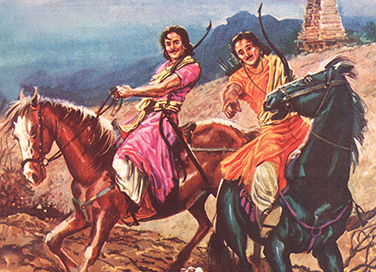
Hakka and Bukka, the Founders of Vijayanagara
- October 31, 2022
By Srinidhi Murthy
Hakka and Bukka, the valiant brothers from Warangal, overcame every hurdle thrown their way, to become the founders of one of the greatest Indian empires – Vijayanagara.
In 1310, Malik Kafur led the army of Ala-ud-din Khilji to capture the fort of Warangal. Though the army of Warangal fought back bravely, King Pratapa Rudra was forced to accept defeat in the end. As an act of surrender, Pratapa Rudra sent a golden image of himself, with a gold chain around the neck, to Malik Kafur. Malik Kafur happily informed Khilji that the doors had opened for them for their conquest of the south. However, soon hope emerged again in the king’s mind, with the death of Khilji. Unfortunately, things began to go downhill once again for the king, when he refused to pay tributes to the new sultan, Ghiyas-ud-Din. In retaliation, Ghiyas ud-din invaded Warangal. The king was defeated by Ghiyas-ud-Din and at the end of the war, the sultan’s army rode away in triumph, taking with them rich booty from Warangal.
To receive more such stories in your Inbox & WhatsApp, Please share your Email and Mobile number.
Hakka and Bukka were the sons of Sangama, a chieftain of Warangal. They introduced themselves to Pratapa Rudra and demonstrated their loyalty to him. Meanwhile, the army of the sultan invaded Warangal again, when Pratapa Rudra refused to pay tribute even after his defeat. Hakka and Bukka joined the battle and fought bravely for the king. One night, a rumour about Ghiyas-ud-Din’s death spread rapidly among the soldiers of Warangal. Hakka and Bukka convinced Pratapa Rudra to use this opportunity to spread the rumour to the enemy camp too, in order to demoralise them. Their strategic plan worked as most of the military chiefs in the sultan’s army believed the rumour. They left with their men for Delhi, without even informing their commander.
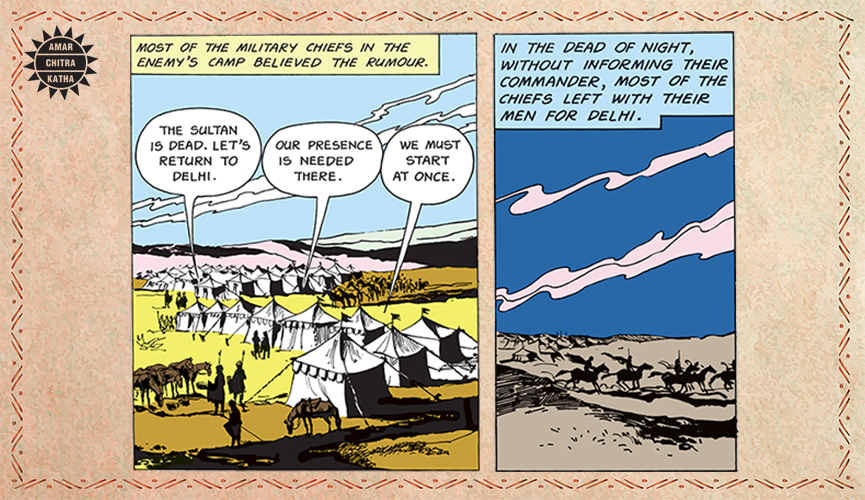
Though Pratapa Rudra gained victory over the army of the sultan, the threat of invasion still lingered around Warangal, even after two years. When the city was attacked again by the sultan’s army, the king was outnumbered and captured by his enemies. Hakka and Bukka tried to impart courage into the hearts of their fleeing soldiers but to their dismay, they learnt that Pratapa Rudra had killed himself on his way to Delhi, to escape the humiliation of imprisonment. Soon, the dejected brothers met the Prince of Kampili, on their way to the south. The prince introduced them to his father, King Kampili Deva. A few days after the arrival of the brothers in Kampili, Baha-ud-din, the nephew of the new sultan, Muhammad-Bin-Tughlaq, arrived at the court of Kampili Deva. Baha-ud-din had incurred the wrath of his uncle and sought refuge from the king. Moved by pity, Kampili Deva promised protection to the distressed Baha-ud-din.
When the sultan sent him a message to surrender his nephew to him, Kampili Deva refused to betray Baha-ud-din. So, Tughlaq’s army attacked Kampili and was defeated, twice. Though he emerged victorious twice, Kampili Deva shifted the capital to Anegundi. As suggested by his council, this city was impregnable and could withstand any attacks in future. However, the battles between Kampili Deva and the army of the Sultan seemed never-ending. In the final battle of Anegundi, losses were severe on both sides. At dawn, the ladies of the royal family underwent jauhar by entering into fire. The next day, Hakka and Bukka rode with the prince to face the army of the sultan. Unfortunately, both the brothers were wounded in battle and fell unconscious. When they gained consciousness, they found that the battlefield was filled with corpses along with the bodies of Kampili Deva and the prince. They lamented over the death of the heroes, who fought bravely against the army of the sultan. Then, they went to Hoysala, where Baha-ud-din had been sent for his safety.
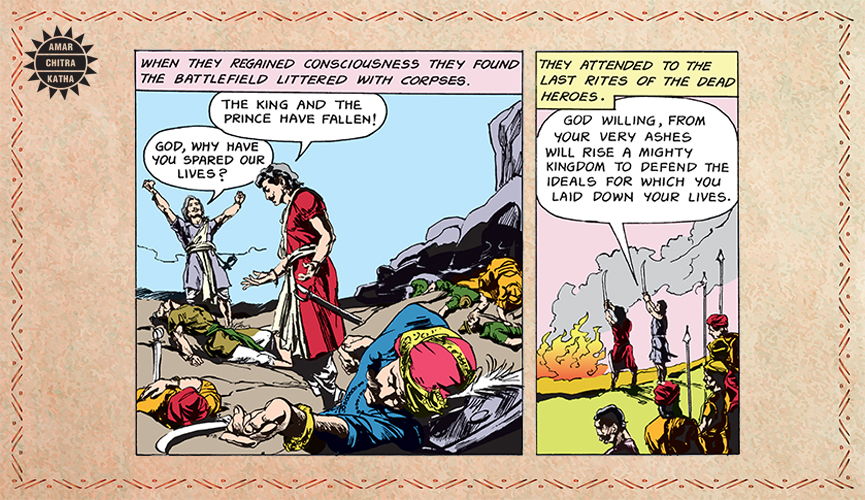
On their arrival, the Hoysala king shared some more bad news with them. He told them that Baha-ud-din had been taken away when Tughlaq’s army had invaded Hoysala. The Hoysala king was impressed by Hakka and Bukka’s determination to regain their lost territories, even after facing defeats at Warangal and Kampili. The two brothers left Hoysala and went into hiding to escape from the soldiers of the sultan. During this time, they met Sage Vidyaranya, who decided to help them in raising their army.
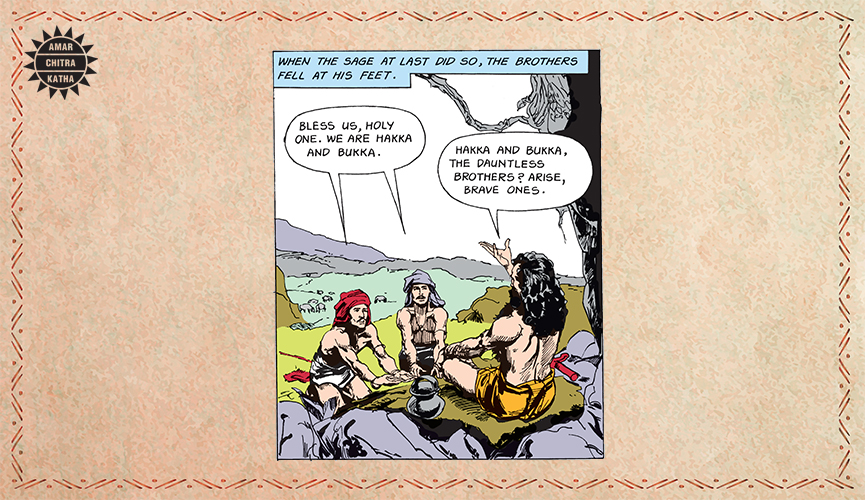
Vidyaranya showed them a secret passage, where they could train thousands of soldiers without raising any suspicion. He also told them that they could train men who came to temple, through the secret passage. Their plan worked as thousands of men were trained secretly by Hakka and Bukka. With the blessings of Vidyaranya, Hakka and Bukka captured the fort of Anegundi at night. The people of Anegundi gave a rousing welcome to Hakka and Bukka when they entered the city.
A few days later, Hakka and Bukka crossed the Tungabhadra River while out on a hunt with their dogs. Their dogs chased a hare. The hare ran fast, but came to a sudden halt at a particular place and bravely fought the dogs back. When the brothers reported this incident to Vidyaranya, he said that the aura of that place must have evoked bravery in the hare. He also suggested that Hakka and Bukka build a kingdom at the same spot.
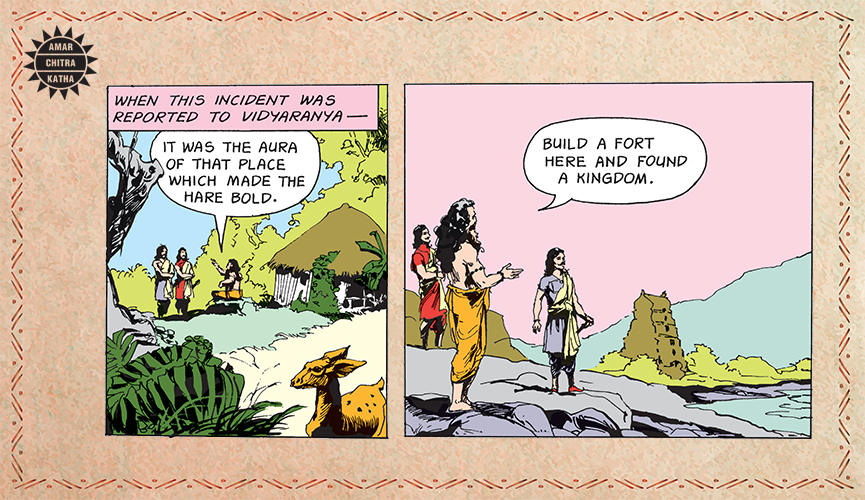
Later, Vidyaranya rejected the brothers’ request to name the city after him. Instead, he named the city Vijayanagara, the City of Victory. With the name Harihara Raya I, Hakka became the first king of Vijayanagara, a small kingdom that eventually rose to become one of the mighty empires in Indian history.
To receive more such stories in your Inbox & WhatsApp, Please share your Email and Mobile number.
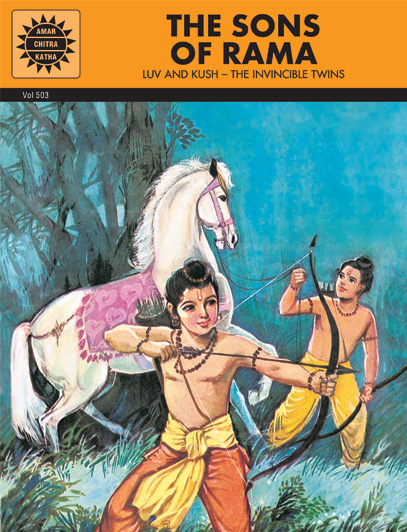
Comic of The Month
The Sons of Rama
The story of Rama and Sita was first set down by the sage Valmiki in his epic poem 'Ramayana.' Rama was the eldest son of Dasharatha, the king of Ayodhya, who had three wives - Kaushalya, Kaikeyi and Sumitra. Rama was the son of Kaushalya, Bharata of Kaikeyi and Laxmana and Shatrughna of Sumitra. The four princes grew up to be brave and valiant. Rama won the hand of Sita, the daughter of King Janaka. Dasharatha wanted to crown Rama as the king but Kaikeyi objected. Using boons granted to her by Dasharatha earlier, she had Rama banished to the forest. Sita and Laxmana decided to follow Rama. While in the forest, a Rakshasi, Shoorpanakha, accosted Laxmana but had her nose cut off by him. In revenge, her brother Ravana, king of Lanka, carried Sita away. Rama and Laxmana set out to look for her and with the help of an army of monkeys, defeated Ravana. On returning Ayodhya after fourteen years of exile, Rama banished Sita because of the suspicions of his subjects. In the ashrama of sage Valmiki, she gave birth to her twin sons, Luv and Kush.